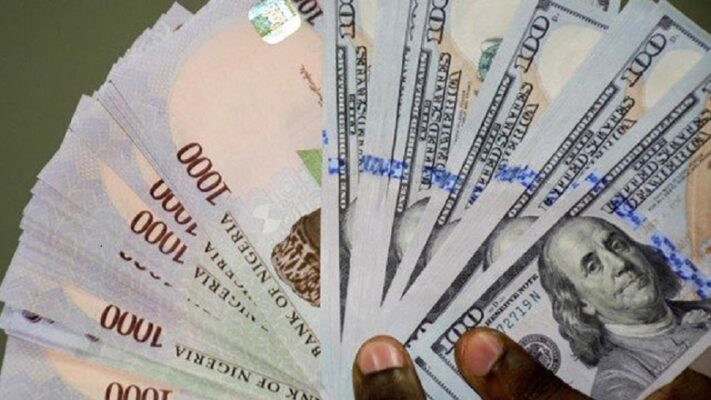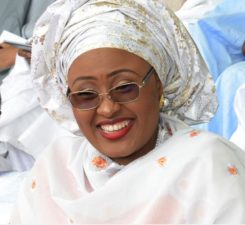*Official rate exchanges for N902
*As Nigeria eyes $1.5bn World Bank aid
The poor value of the naira has also continued to tell on the cost of living for Nigerians.
There is no respite yet for Nigeria’s currency as naira continues to fall against the US dollar, exchanging at N1,355 at the black market on Thursday, checks by Daily Trust have shown, Daily Trust reported on Friday January 19, 2024.
According to the report, this was coming five months after the dollar first crossed N1,000 in the black market.
While the dollar maintained its momentum up till press time last night, it slightly appreciated to close at N902 from N931.23 to a dollar at the close of business, based on data from NAFEM, where forex is officially traded.
The poor value of the naira has also continued to tell on the cost of living for Nigerians.
Despite receiving a $2.25bn foreign exchange support from the AfreximBank last week and the claim that the Central Bank of Nigeria (CBN) had improved clearing of forex obligations aimed at bolstering the market, depreciation of the naira has continued to worsen.
Our correspondents report that the rate hovered between N1,170 to N1,200 between the end of December, 2023, and the first week of January 2024. This was at a time when government officials were saying the naira will rebound considering the measures put in place.
But in the last few days, the pressure on the currency increased with the naira crossing N1,300 to a dollar at the black market.
Situation in states
In Lagos and Abuja, the dollar yesterday exchanged for N1,350 and N1,355.
A Bureau de Change operator in the FCT, Gidado Ibrahim said, “I don’t know what is happening again, because you can imagine for some time now, it was exchanging between N1, 200 to N1, 250 to the dollar and just from yesterday it has gone to N1, 355 and even more.
“To worsen the situation, the dollar is just going up against the naira and it doesn’t look like the naira will recover anytime soon. The government needs to sit up,” He said.
Also speaking, another BDC operator, Ali Musa told Daily Trust that, “Dollar is even difficult to get. Anyone that wants to buy up to $1,000, we have to source from colleagues.
“I think the scarcity is what is causing it (US dollar) to be going up and it is unfortunate because it will reach a point where people will no longer be interested in buying. Even myself, I am angry because the dollar should not be this high against the naira,” he lamented.
While the dollar maintained its momentum up till press time last night, it slightly appreciated to close at N902 from N931.23 to a dollar at the close of business, based on data from NAFEM, where forex is officially traded.
The poor value of the naira has also continued to tell on the cost of living for Nigerians.
Despite receiving a $2.25bn foreign exchange support from the AfreximBank last week and the claim that the Central Bank of Nigeria (CBN) had improved clearing of forex obligations aimed at bolstering the market, depreciation of the naira has continued to worsen.
2024 budget: How we settled for N800 to dollar exchange rate — Bagudu
Our correspondents report that the rate hovered between N1,170 to N1,200 between the end of December, 2023, and the first week of January 2024. This was at a time when government officials were saying the naira will rebound considering the measures put in place.
But in the last few days, the pressure on the currency increased with the naira crossing N1,300 to a dollar at the black market.
Situation in states
In Lagos and Abuja, the dollar yesterday exchanged for N1,350 and N1,355.
A Bureau de Change operator in the FCT, Gidado Ibrahim said, “I don’t know what is happening again, because you can imagine for some time now, it was exchanging between N1, 200 to N1, 250 to the dollar and just from yesterday it has gone to N1, 355 and even more.
“To worsen the situation, the dollar is just going up against the naira and it doesn’t look like the naira will recover anytime soon. The government needs to sit up,” He said.
Also speaking, another BDC operator, Ali Musa told Daily Trust that, “Dollar is even difficult to get. Anyone that wants to buy up to $1,000, we have to source from colleagues.
“I think the scarcity is what is causing it (US dollar) to be going up and it is unfortunate because it will reach a point where people will no longer be interested in buying. Even myself, I am angry because the dollar should not be this high against the naira,” he lamented.
Another BDC operator in Lagos, Mr Abu Dollar said it was sold for N1,350 yesterday Thursday January 18, 2024).
He said the price increase might continue because of the acute shortage of dollars in the market.
“As I am talking to you, many people are unable to get the dollars. I think it is because of people travelling. Some of them came for the holiday and they want to return. This I believe is one of the reasons for the hike in rate.”
Traders decry poor access foreign currency
Daily trust findings revealed that some importers have stopped trading over their inability to access foreign currency and the recent hike in import duty rates.
A former vice president of the Association of Nigerian Licensed Customs Agents, Mr Kayode Farinto expressed his concern about the dwindling level of importation, stating that most imports in recent times have been raw materials for the production of other goods.
To encourage importers and traders to continue their businesses, Farinto called on the federal government to introduce measures that would provide incentives.
He stated that monetary policy in Nigeria has been negatively influenced by preferential treatments and regulatory laxity.
Abdullahi Hussaini, a trader in Kano said they have been affected by the spike.
“I normally travel to the United States, China, Germany, Dubai, Turkey, among others. Sadly, I only travelled out once since June, 2023. I used to import vehicles and textiles materials.
“The rate at which naira is depreciating is unthinkable, it appears our currency is almost the worst. Whenever you import something, the gains are swallowed by the inflation ravaging the naira and you go back to buy the goods, you end up coming back home with less,” he said.
While the dollar maintained its momentum up till press time last night, it slightly appreciated to close at N902 from N931.23 to a dollar at the close of business, based on data from NAFEM, where forex is officially traded.
The poor value of the naira has also continued to tell on the cost of living for Nigerians.
Despite receiving a $2.25bn foreign exchange support from the AfreximBank last week and the claim that the Central Bank of Nigeria (CBN) had improved clearing of forex obligations aimed at bolstering the market, depreciation of the naira has continued to worsen.
Fatiyya Yunus Sabiu, another importer in Kano said it appears most of the policies put in place by the present administration to address the forex crises are not working.
“They should go back to the drawing board. They should also ask other countries with relatively stable currency when compared with the US dollar on how they are managing their. They told us floating the naira is the best way to checkmate the dollar but evidently they are wrong, we are worse now,” she said.
Many industries may shut down – Prof Sheka
An Economist at the Bayero University, Kano (BUK), Prof. Garba Sheka said Nigeria might be heading towards a serious problem, saying the rate at which naira was falling could destabilise the economy.
“Many industries would have closed. Those that would remain in the market are those producing essential commodities that people cannot do without it.
“All other producers would have closed down. This would aggravate unemployment and inflation will continue. Foreign exchange can destabilise the economy,” he stated.
According to him, hoarding is another major challenge.
“We are heading towards a very serious problem. With the coming of Dangote refineries, we might have a relief if the refinery can prevent the government from importing.
“This is a sector that the government doesn’t play with. They always allocate enough dollars to import refined products because they don’t want a fuel shortage crisis. Now that Port Harcourt refinery has finished test-running and Dangote refinery has started production, probably before the end of January, we might not need to import refined products.
“All the dollars we spend importing fuel can now be used on other things and there would be less pressure on dollars and people can have access to it.”
The economist explained that the demand for dollars would continue to put pressure on the local currency since the supply is minimal.
“The parallel market is the predominant market. I have somebody who imports some ingredients in his factory. He said he always needs about $10,000 and what he could get after all processes is $5000 and he has to go to the parallel market for the remaining.
“As far as small and medium enterprises are concerned, this parallel market is the most important market.”
Lagos State Chairman of the National Association of Small and Medium Enterprises (NASME), Prof. Adebayo Adams, said, “This is beyond everybody. Our survival as businesses is in the hands of God. Diesel has gone haywire now. Anyone that is going to use raw materials requiring dollars, it would be very difficult.
“There is nothing any small business can do now other than to diversify. The little money we have, we should invest it in commodities. The major things people are patronising now are food and medicine,” he said.
Nigeria eyes $1.5bn World Bank aid
Meanwhile, the Minister of Finance and Coordinating Minister of the Economy, Wale Edun in a media interview yesterday, said: “We are hoping to get $1 billion or $1.5 billion from the World Bank” for budgetary support.
He spoke in a Bloomberg Television interview with Francine Lacqua. “It is a matter of discussion at the moment, but we think we will get the support because we are continuing with our reforms,” he said.
The CBN in its recent statement said that it had carried out a major financial injection of approximately $2 billion spanning diverse sectors, including manufacturing, aviation, and petroleum.
It highlighted the successful clearance of the entire liability of 14 banks, marking a significant milestone in resolving the forex backlog, and initiated settlements with foreign airlines.




